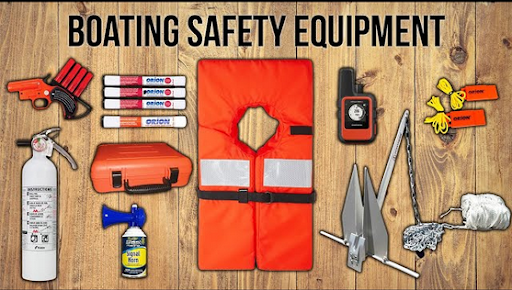Top 10 Marine Supplies Every Cargo Vessel Should Stock Up On

Cargo vessels are the lifeblood of international trade. Every day, they carry billions of dollars' worth of goods across oceans, connecting countries and keeping the global economy moving. But behind this massive operation is a simple truth: ships can’t sail efficiently without the right supplies onboard.
From engine parts to safety gear, marine supplies are not just "nice to have" — they’re essential. In this blog, we’ll dive into the top 10 marine supplies every cargo vessel should stock up on before leaving port, and why working with a trusted ship chandler like ISSMT – International Ship Supply & Marine Technology in Chittagong, Bangladesh, can make all the difference.
Why Stocking the Right Supplies Matters
Vessels often travel thousands of nautical miles without docking. During this time, resupplying isn't an option. That means one forgotten item or malfunctioning part can delay operations, cause safety issues, or result in financial penalties.
A well-stocked cargo vessel ensures:
Continuous operation without interruptions
Full compliance with international maritime regulations
Safety for the crew and cargo
Preparedness for emergencies or breakdowns
Let’s explore what those must-have items are.
1. Safety Equipment
When you're thousands of miles away from shore, safety equipment becomes your lifeline. Cargo vessels are required to carry a wide range of safety gear to comply with SOLAS (Safety of Life at Sea) regulations.
Essential safety items include:
Life jackets and life buoys
Fire extinguishers and fire blankets
Emergency escape breathing devices (EEBDs)
Immersion suits
First aid kits
Flares and distress signals
Neglecting safety supplies not only puts lives at risk but can also lead to severe penalties during port inspections.
2. Engine and Machinery Spares
Marine engines operate under extreme conditions — continuous use, high temperature, and saltwater exposure. To avoid mechanical failures mid-voyage, vessels should carry vital engine and auxiliary equipment spares.
Must-have spares include:
Fuel pumps and filters
Gaskets and seals
Engine oil and lubricants
Bearings, valves, and piston rings
Alternators and belts
3. Lifesaving Appliances
Beyond standard safety gear, lifesaving appliances (LSA) are legally mandated on cargo ships. These are used in case of evacuation or severe onboard emergencies.
Typical LSAs include:
Inflatable lifeboats and rescue boats
Survival kits
Hydrostatic release units (HRU)
Liferaft repair kits
Emergency rations and drinking water
All items must be inspected regularly and replaced before expiry to remain compliant.
4. Cleaning and Maintenance Supplies
Ship hygiene isn't just for comfort — it’s critical for crew health and machinery longevity. Salt, grease, and cargo residues can degrade surfaces and contaminate essential systems.
Common supplies:
Deck and engine room degreasers
Rust removers and metal polishes
Brushes, mops, buckets
Disinfectants and sanitizers
Bilge cleaning agents
Cleanliness is also a regulatory requirement under MARPOL (Marine Pollution).
5. Tools and Hardware
From quick fixes to full maintenance work, vessels must be prepared to handle repairs on the go. Stocking a robust set of tools and hardware items prevents small issues from turning into major delays.
Key items:
Wrenches, spanners, and hammers
Welding gear and soldering kits
Electrical testers and multimeters
Nuts, bolts, screws, clamps
Ropes, shackles, and pulleys
Keeping an onboard inventory ensures faster fixes and less dependency on offshore repair services.
6. Provisions and Galley Supplies
Feeding the crew is a daily necessity, especially during long voyages. Poor-quality or insufficient food can harm morale and affect productivity.
Essential provisioning includes:
Dry and canned food
Fresh fruits and vegetables
Dairy, eggs, and meat
Bottled water and beverages
Cooking oil, spices, and condiments
Galley equipment like cooking utensils, dishware, and cleaning materials should also be stocked.
7. Documentation and Nautical Charts
Digital systems are great, but paper-based navigation and compliance documents are still crucial — especially when tech fails.
Include:
Updated nautical charts
Port guidebooks
IMO codebooks (e.g., IMDG, SOLAS, MARPOL)
Crew documentation forms
Maintenance and inspection logs
Staying compliant with international maritime law means having these ready at all times.
8. Electrical and Lighting Supplies
Reliable power and lighting are essential for safety and navigation. Cargo vessels should always carry replacement parts for electrical systems.
Common electrical supplies:
Fuses and circuit breakers
LED bulbs and floodlights
Cables and connectors
Battery chargers
Emergency lighting kits
Electrical malfunctions are among the top causes of maritime safety violations — best to avoid them.
9. Communication and Navigation Equipment
Whether it's avoiding collisions or contacting the coast guard, comms and nav systems are non-negotiable.
Make sure to have:
Spare VHF radios and antennas
Radar components
GPS systems
AIS devices (Automatic Identification System)
Satellite phones and chargers
A functional communication system also contributes to real-time cargo tracking and route management.
10. Bonded Stores
While not essential for operations, bonded stores improve crew morale and provide comfort on long journeys.
These include:
Cigarettes, cigars
Alcoholic beverages
Chocolates and snacks
Personal care items
Entertainment (magazines, games, etc.)
Bonded stores are sold duty-free and must be carefully documented under customs regulations.
Where to Source Marine Supplies in Chittagong
Chittagong Port is one of the busiest and most strategic ports in South Asia. When vessels dock here, time is limited — and quality, speed, and reliability of service matter most.
Based right in Chittagong, ISSMT provides everything from provisions and safety gear to bonded stores and spare parts. With a reputation for fast service, competitive pricing, and 24/7 availability, they’re the trusted partner of vessels from across the globe.
Final Thoughts
A cargo vessel is a self-contained ecosystem — and like any machine, it needs the right inputs to function properly. Stocking up on the top 10 essential marine supplies isn’t just smart; it’s a necessity.
Before you sail out, make sure your supply list checks all the boxes. And when you’re at Chittagong Port, partner with professionals who know exactly what you need and deliver it on time.
Note: IndiBlogHub features both user-submitted and editorial content. We do not verify third-party contributions. Read our Disclaimer and Privacy Policyfor details.







